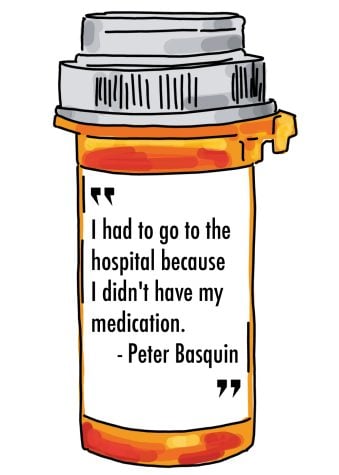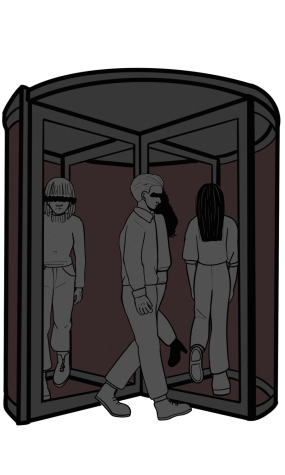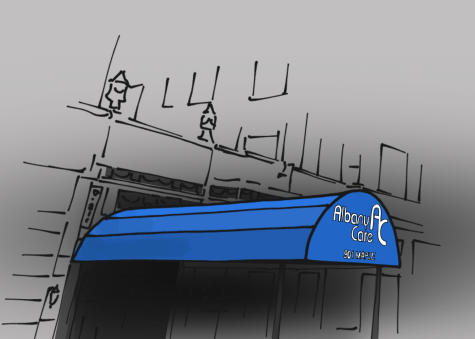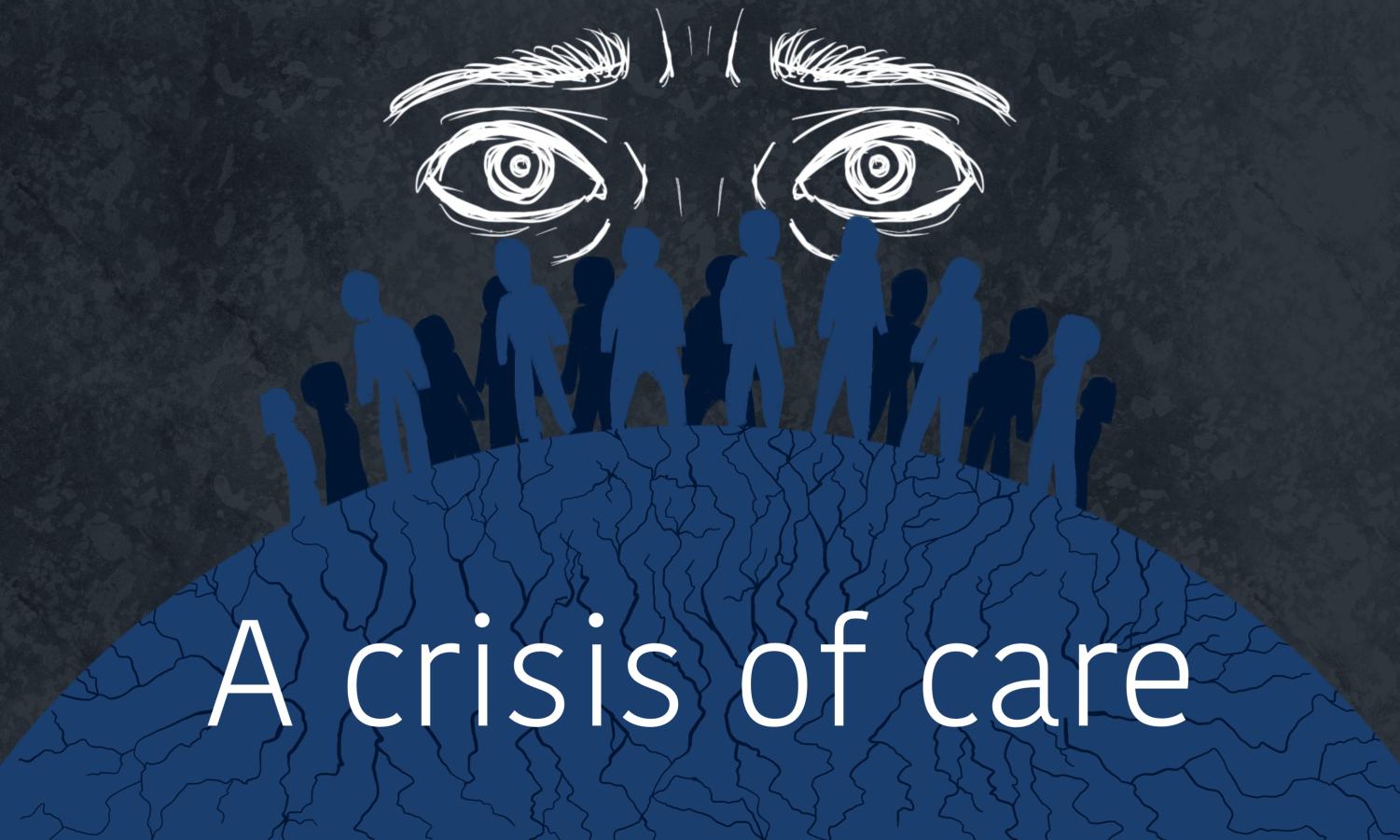In Focus: Albany Care’s residents report violence and medical mistreatment. But many may have nowhere else to go
November 14, 2022
Content warning: This article contains discussion of medical mistreatment, assault, suicidal ideation and racism.
Peter Basquin moved out of one Chicago-area residential mental health care facility because of bedbugs, cockroaches and lice. He left another because it lacked the counseling structure he needed.
Basquin said he wound up at Albany Care in 2019, where another resident assaulted him.
The long-term mental health care facility, located in Evanston’s 4th Ward, is legally required to help Basquin find transitional housing. Still, he has struggled to move out. He applied for Supplemental Security Income to support his transition and appealed twice, but he was denied each time. For now, he’s staying at Albany Care.
“What am I gonna go to?” Basquin said. “I’m not going to be homeless. I’m not going to go out and live in a shelter. I’m glad that I have a roof over my head.”
In recent years, Albany Care residents have struggled to access vital medication while reporting a shortage in therapists and nurses. A new executive director took over the 417-bed facility in October 2021, followed within a year by Interim Executive Director Megan Marker. Meanwhile, residents in the 4th and 9th wards have expressed concerns to city government about Albany Care’s impact on the neighborhood.
After an initial investigation, the Illinois Department of Public Health barred Albany Care from onboarding new residents in February.
But at a Nov. 1 ward meeting, Ald. Jonathan Nieuwsma (4th) — who represents Albany Care’s residents — announced the facility had begun admitting people again. Albany Care currently houses 223 residents, Marker said in a Nov. 4 email to The Daily.
Local health care and housing don’t adequately support those with mental illnesses, Nieuwsma said.
“You need to be part of a system that is set up to provide treatment and provide services,” he said. “Once you get to Albany Care, you’re part of the system. The problem is the system isn’t good.”
‘The whole facility is in chaos’
Albany Care’s former director of nursing and three nurses quit on the same day in early November 2021, according to IDPH investigation records obtained by The Daily.
IDPH records showed patients often didn’t receive medications on time. Staff sometimes combined dose distribution times or woke patients at 4 a.m. to give them medication.
On Nov. 15, 2021, an ombudsman told the IDPH, “The whole facility is in chaos.”
Basquin said at one point he didn’t receive medication for days.

“I had to go to the hospital because I didn’t have my medication,” Basquin said. “There was no nurse to distribute medication to any client here. People were getting sick.”
Stabilizing clients is a central goal for mental health programs like Albany Care’s, said Danielle Shannon, a licensed social worker at the Center for Contextual Change in Skokie.
“Being able to at least offer medication management and then provide that medication regularly is hugely important,” they said.
But at Albany Care, more than 20 sheets tracking consumer’s medication distribution between Nov. 1 and Nov. 27, 2021, showed blank spaces at multiple times throughout the day. The sheets should have documented patients receiving or missing their medications, according to IDPH investigation records.
“Friday night, I got medication at 10:30 PM. I was supposed to get it at 5:00 PM,” one resident said to IDPH on Nov. 23, 2021. “On Saturday, I got medication at midnight, and on Sunday, at 10:30 PM. Some people were woken up, some weren’t and they just didn’t get medication.”
Multiple nurses told the IDPH they were overworked and unable to properly distribute medication, leaving patients across the facility vulnerable. Many nurses also worked shifts lasting less than less than two hours in late 2021, according to IDPH investigation records.
Marker, the Albany Care interim executive director, did not directly comment on allegations of missing medications. However, she said staffing shortages have been common throughout the industry since the beginning of the COVID-19 pandemic.
“In any case, we have always maintained a seamless management structure that ensured continuity of care,” she wrote to The Daily.
Barriers to long-term care
Basquin said he’s insured by Medicaid. So are the majority of Albany Care residents, according to Marker.
Medicaid is an insurance assistance program for low-income patients. Albany Care accepts Medicaid, Medicaid Pending and many private insurances, according to its website.
Without private insurance, people generally have fewer options for care, said Northwestern Prof. Charlayne Mitchell, who studies health equity.
“You don’t get to pick and choose when you don’t have … excess money to pay out of your pocket,” Mitchell said.
Chicago area statistics on the cost of long-term mental health care are hard to come by. But total hospital costs for serious mental illness in Illinois exceeded $360 million in 2014, according to data presented by the University of Southern California. Medicaid accounted for 40% of these hospitalizations, while Medicare paid for 32%.
One-third of people in Illinois with serious psychological distress could not afford adequate mental health treatment in 2017, according to the USC presentation.
That’s because private long-term mental health care facilities are usually much more expensive than state-licensed ones, according to Shannon. Most of Shannon’s clients seeking long-term mental health care go to private facilities because they have the economic means, she said.
But some have taken out loans to access private health care.
“These programs can cost upward of $30,000 for (about a month),” Shannon said. “The average person doesn’t have that kind of financial resources.”
A substantial risk
Basquin blames Albany Care for his hospitalization, which was caused by suicidal ideation. As a result, Basquin said he asked facility employees to hospitalize him.
“If they had given me my medication, I would not have an issue with that,” Basquin said. “I’m not suicidal, but without taking my medication, that’s what was going through my mind.”
Even before his hospitalization, Basquin had filed a grievance to the IDPH in early 2021. Because the IDPH licenses the facility, residents can submit complaints to the department.
Albany Care is one of more than 20 Specialized Mental Health Rehabilitation Facilities across Illinois. Evanston has two SMHRFs: Albany Care in the 4th Ward and Greenwood Care in the 3rd. Greenwood Care is significantly smaller with only 145 beds.
The IDPH must conduct surveys of SMHRFs at least once a year, speaking with staff members and residents. The department ranks long-term care facilities from one to six, with level six resulting in the revocation of a facility’s license.
In December 2021, the IDPH conducted a survey of Albany Care and issued the facility a Level 5 rating on Jan. 31. That rating indicates substantial risk of death or serious physical or mental harm to a consumer.
The investigation reported instances when Albany Care failed to cooperate, saying it refused to provide records on 23 cases reviewed for improper nursing care.
The department fined the facility $12,500. The investigation looked into allegations of lack of staff, improper nursing care and failure to control medications. All were “substantiated” in the December 2021 survey.
But another IDPH survey this past April deemed Albany Care to be at a level two, just two months after the facility was restricted from onboarding new residents in February. Still, the survey found nurses were not properly distributing medication, and patients’ medication records continued to include blank spaces.
The IDPH continued listing Albany Care at level two following another survey in June. It also noted late medications, blank spaces in medication flowsheets, problems updating individualized treatment plans and incidents of drinking, smoking and “sexually inappropriate” behavior.
An IDPH spokesperson declined to comment on the department’s findings, citing the ongoing investigation and busy staff schedules.
A ‘revolving door’ of therapists
Under state health rules, SMHRFs are required to have one mental health professional to lead therapy and group activities for every 32 clients. But Basquin said he couldn’t access an MHP for extended periods this year.
“I still don’t have a counselor. And it’s been months since I had one,” Basquin told The Daily in May. “The last one I had lasted for, I don’t know, maybe three, three to seven days and they never came back.”
Basquin said he wasn’t able to access a mental health professional consistently until about a month ago, comparing the rate at which they quit to a “revolving door.”

Shannon, the social worker, emphasized that patients need a professional who is knowledgeable about their experience, available in times of crisis and collaborative with other providers. But Shannon said it’s hard to build patient-therapist relationships when facilities struggle with retention.
“Dysfunctional or unhealthy dynamics can impact relationships between staff and clients. That’s really important to consider,” Shannon said. “I imagine there’s very high turnover with staff because they’re underpaid and doing very challenging, stressful work.”
As of early November, Basquin said he knew of six mental health professionals serving Albany Care’s roughly 220 patients — which would be about one for every 37 residents. Albany Care did not confirm the number of mental health professionals it currently employs.
The facility is also now admitting new patients. In her statement to The Daily, Marker said intake numbers vary, and the facility is “fully compliant with the State of Illinois standards.”
Basquin, however, expressed concerns about admitting new residents.
“They are bringing in people every day,” Basquin said. “They are re-admitting people that used to be here that were asked to leave … There are issues that need to be addressed.”
Residents report racism and violence
Basquin said about two years ago, one of his roommates threw him against a bathroom door handle hard enough that he needed stitches. When Basquin returned from the hospital, the roommate was still in his room.
“I said, ‘I want to press charges. You know, this is assault, battery,’” Basquin said. “(The front desk worker) told me I couldn’t press charges. I said, ‘Why?’ ‘Because you’re in a facility like this.’”
Marker told The Daily incidents like this can happen because many patients are fighting serious mental health or addiction issues. She said residents act “out against imagined threats or (are) acting against perceived enemies who can sometimes include their caretakers.”
Regardless, Marker said all allegations are investigated, though she didn’t specify by whom.
Basquin isn’t the only resident who has reported violence from a roommate. IDPH found that one patient got into a verbal and physical altercation with their roommate in January after calling the roommate’s visitor a racist slur.
Staff separated the residents and sent one to a local hospital. However, IDPH records show the incident wasn’t reported to the department.
The clinical director told the IDPH they unsuccessfully tried to send the reports to the state regulatory agency. The director said submitting those reports to the IDPH had typically been a nurse’s duty.
“I emailed it to myself from the copier where I scanned and sent it to [State regulatory agency],” the director said in the investigation. “I don’t know how to get it from the copier. I’ll forward the email I sent to myself.”
Albany Care did not update treatment plans for either patient after the incident, according to the IDPH survey.
Basquin, who is Asian, said he has also faced racism at Albany Care. One worker at the front desk repeatedly called him anti-Asian slurs.
“(The worker said,) ‘Why don’t you go back to your country? Why? Why didn’t you and your entire family move back to Korea? That’s where you deserve to live,’” Basquin said.
Basquin said he filed a complaint with the IDPH.
“Two weeks later, (the worker) approaches me and says, ‘Why did you call Illinois Department of Public Health?’” Basquin said. He said the worker threatened to physically assault him.
The worker was told not to speak to Basquin, though he remains at Albany Care, Basquin said. Now, Basquin said he just does his best to avoid the worker.
When asked about allegations of racist incidents at the facility, Albany Care did not directly comment on the matter.
Wards split on Albany Care’s future
As IDPH records found Albany Care residents faced staffing issues and missing medications, nearby 4th and 9th ward residents discussed what they called an uptick in panhandling, drug dealing and other problems in Grey Park, across the street from Albany Care.
Katherine Gotsick, the executive director of Evanston’s Main-Dempster Mile, said she’s fielded concerns about Albany Care residents since 2016.

Prior to 2018, Gotsick said she heard fewer complaints. But she said around that year, she noticed an escalation in panhandling near Main-Dempster Mile.
“(There) was a population that was more aggressive than the previous population,” Gotsick said. “Money was more of a concern for (them).”
City law permits panhandling but bans “aggressive panhandling.” Evanston defines aggressive panhandling as actions that “a reasonable person” would see as harassing, intimidating or compelling a contribution.
Several Main Street business owners and nearby residents shared similar concerns with The Daily.
Mitchell, the global health professor, said language surrounding panhandling often echoes racist stereotypes of “aggressive or angry” Black people. Black and Latine people trying to access mental health care are often criminalized, she said.
“We criminalize getting access to mental health versus actually trying to treat the issue,” Mitchell said. “That’s where we get to see where it’s ‘aggressive.’”
Residents also complained about drug use and public urination in Grey Park.
Dan Coyne, a 9th Ward resident, helped start a neighborhood Facebook Group to address concerns around Albany Care. The group, called the Grey Park Community, is composed of 4th and 9th ward residents and business owners seeking a solution to the facility’s impact on their community.
Coyne said he’s eager to develop a better relationship between neighbors and Albany Care’s residents. He said he worked toward that goal by helping organize park clean-ups and the installation of a portable toilet last year.
Still, Coyne doesn’t think it’s possible to improve community interactions while Albany Care operates at full capacity. He said he thinks the facility should cap its patient numbers before hitting its maximum occupancy.
“That’s when we’ve seen some of the increase of some of the crimes and drug activities in the neighborhood,” Coyne said. “I don’t think it’s a sustainable model at 420 residents.”
Neighborhood residents brought Nieuwsma into the debate after he was sworn in to City Council in May 2021.
“The more I got involved in it, the more it became obvious that issues in the neighborhood were a direct result of issues inside the building — lack of care, inadequate staffing, inadequate programming and the residents of Albany Care itself … not receiving the care that they need,” Nieuwsma said.
Michael Jones, Evanston Police Department’s community police officer for the 3rd and 4th wards, said he’s worked to address resident concerns about problems like drug use and public urination.
He responded to complaints in Grey Park and worked with the facility to address them, though he doesn’t know if Albany Care residents were responsible for all of those complaints.
“A lot of the issues are just small quality-of-life issues. But they’re impactful,” Jones said. “Putting out some of those small fires is kind of what my job is.”
Jones receives calls directed to the community policing unit, not 911. As the number of residents at Albany Care decreased and the facility hired security guards, he said he received fewer calls.
In addition to working with EPD, Nieuwsma approached city officials and state Rep. Robyn Gabel (D-Evanston) to address concerns about Albany Care.
Because Evanston has two SMHRFs, Gabel told The Daily in an email that long-term mental health care is more accessible in the city than elsewhere in Illinois — but it’s still inadequate. She said she supports measures to prevent risk factors that often impact mental health, especially housing instability.
“Community-based supportive housing appears to be the best way to address long-term mental health needs,” Gabel wrote.
A ‘dysfunctional’ system
John Fallon, a National Alliance on Mental Illness Illinois board member and housing stability case manager, said SMHRFs aren’t always the best solution for long-term care.
Fallon said putting hundreds of people in facilities like Albany Care often works poorly because each resident has individual symptoms, needs and personalities. Instead, he wants to see small, affordable apartment buildings with accessible staff who regularly check in on residents.
“The best thing is to slowly reduce the population (of long-term care facilities), and at some point, each one of these will close,” Fallon said.
State legal precedent requires SMHRFs like Albany Care to support residents who want to move into transitional housing.
“Their moving on program — it’s stellar,” Basquin said. “They cross the t’s and dot the lowercase j’s.”
However, Basquin doesn’t want to leave Albany Care without income to help him get on his feet. He said delays in processing Supplemental Security Income applications have been common since the start of the pandemic, and he expects his latest application to take about six to nine months.
In the meantime, Shannon said long-term facilities need to improve patient plans for housing, medical care and financial support.
“There’s limited options for folks who are part of marginalized communities because the way our society is set up is dysfunctional,” Shannon said. “There’s a lack of resources for vulnerable people.”
Email: [email protected]
Twitter: @avivabechky
Email: [email protected]
Twitter: @avanidkalra
Related Stories:
— Mental healthcare providers reflect on Evanston’s public resources this World Mental Health Day
— First-response Alternative Crisis Team provides mental health support to people in crisis

